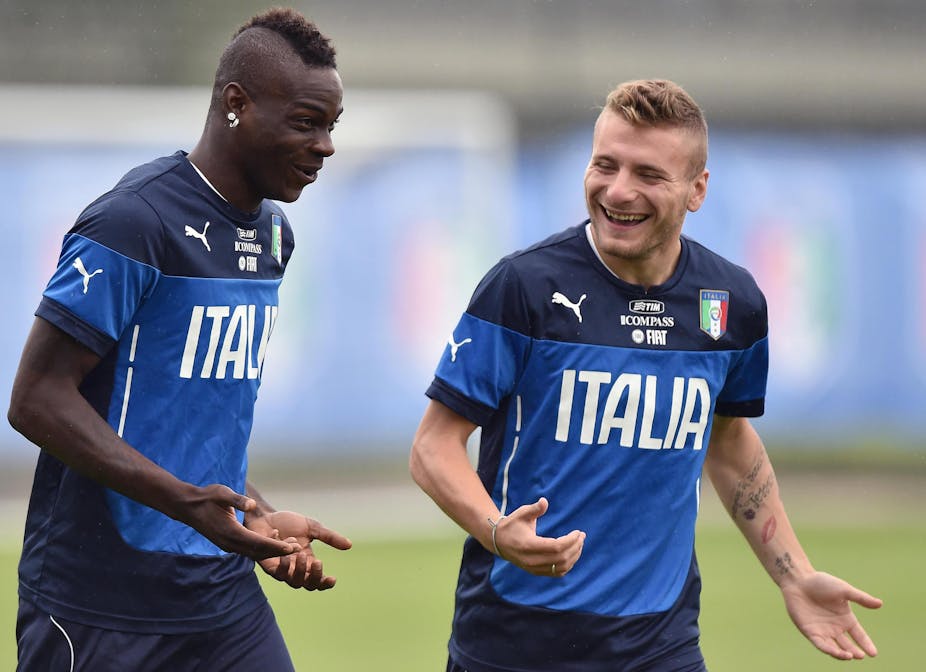For much of its more than 100-year history, Italian football has been dogged by stereotypes. It has been seen as defensive, cynical, as lacking in “fair play”. These stereotypes have often applied to Italian people in general.
And they were not only used by foreigners. The great Italian sports journalist Gianni Brera argued that Italians were too weak to play attacking football, and should concentrate on strong defence and counter-attacking, a “system” which became known across the world with an Italian name – Catenaccio – in the 1950s and 1960s.
Yet, much of this has always been wrong. The fundamental confusion is between “defensive” football and “being good at defending”. Italian defenders were technically way ahead of many other countries in the post-war period, and in particular from the 1950s, when Italian clubs developed sophisticated training methods and disciplined rules and regulations concerning player behaviour. England player Jimmy Greaves found this out to his cost when he went to AC Milan in the early 1960s, and was given a list of daily activities on arrival, including his own bedtime. He only lasted ten games.

So Italians became very good at defending – and this meant that their teams were hard to beat. Italian defenders didn’t just clear the ball, they passed it. But if dirty work needed doing, they could do that as well. Defending was celebrated in Italian football culture. It could be beautiful, as in the sheer elegance of Gaetano Scirea, the greatest of all sweepers, who floated across the grass; and it could be brutal, as in Scirea’s team-mate Claudio Gentile, who refused to allow Maradona to actually receive the ball in the 1982 World Cup. He “cancelled” out the young Maradona through an extreme version of man-marking, aided by a tolerant referee. This helped Italy win the game, and eventually also the tournament.
It was true that Italians were not held back by any Corinthian ideas of fair play. The important thing was to win, whatever it took. Perhaps it is in this “ethical” difference that we can see the origins of some of the stereotypes about Italian football. Italians always saw the tactical foul as a necessity – as part of the game, just like goals and assists. Pre-tactics were also crucial (what we call mind-games), as was the use of the media and, at times, dirty tricks of all kinds. None of this was frowned upon, as long as you won. In fact, Italians don’t have a phrase which translates as “fair play” – they often use the English term instead.
Stereotypes about defensive football are also mistaken in another sense. It was an Italian coach, Arrigo Sacchi, who transformed world football in the late 1980s and 1990s. By introducing a high tempo pressing game, and effectively abolishing the sweeper system, he prefigured tikka-takka and the way that so many teams play today. Sacchi’s teams defended from the front, compressing the space and producing a thrilling, rapid, passing game. Sacchi’s star burned brightly, but quickly faded (he was too much of a tactical purist to last for long) but after Sacchi, nothing was ever the same again.
Sacchi’s Milan team conquered Europe, and his tactical revolution led to a period of Italian club domination which has only recently faded. The national team continued to compete on the world stage – with only penalties preventing further World Cup progress (in 1990, 1994 and 1998) before they finally won a shoot out to take their fourth trophy in 2006.
On the pitch, it is an exciting time for Italian football. A new generation of stars is coming through. Brilliant playmakers (Marco Verratti, 21 years old) and exciting young strikers (Ciro Immobile, 24, and Lorenzo Insigne, 22, alongside the mercurial Mario Balotelli who is still only 23 years old) are set to shine this World Cup.
Second-generation immigrants are breaking into the big teams, creating Italy’s own, troubled version of a “rainbow nation”. Off the pitch, Italian football is still beset by structural issues which mirror those of the Italian state and the Italian economy – corruption, political meddling, lack of reform. But on the pitch, the future seems secure.
Cesare Prandelli’s Italy play to win, and his team is packed with young, mercurial talent as well as the genius of Antonio Cassano – a player who can do things most only dream of.
Italian football: boring? Cynical? No. Tactical? Technical? Intelligent? Yes, yes yes.

